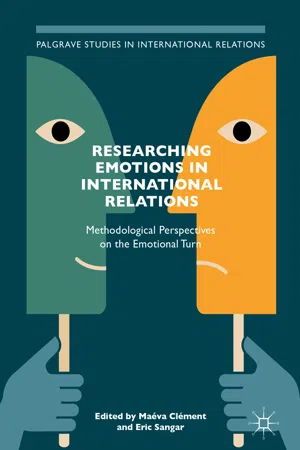- It provides valuable insights into how emotions and affects can be operationalized. It thereby problematizes methodological path dependency , that is, the extent to which ontological positions and theoretical arguments imply specific ways of collecting and analyzing empirical material in concrete research projects. Since methodological choices vary from research project to research project, the authors of this volume write about methodology and methods within the context of their own research project. By reconstructing and making accessible how researchers translated complex theoretical frameworks into concrete empirical analysis, readers can draw practical inspiration for producing both empirically creative and methodologically founded research;
- The volume takes stock of several of the main methods currently used to produce empirical evidence on the role of emotions in IR. The volume does not claim to be exhaustive but focuses rather on the call for integrating tools from ‘classical’ social science with approaches from the humanities in the study of emotions in IR (Bleiker & Hutchison, 2008, p. 131);
- Each individual chapter deals with key challenges identified in the introduction and discusses limits and advantages with regard to the specific method(s) presented. In this regard, the contributing authors remind us that no method is perfect and offer insights and suggestions on how researchers might overcome some of the limits that they identified in their own methodological approach.

Researching Emotions in International Relations
Methodological Perspectives on the Emotional Turn
- English
- ePUB (mobile friendly)
- Available on iOS & Android
Researching Emotions in International Relations
Methodological Perspectives on the Emotional Turn
About this book
This edited volume is the first to discuss the methodological implications of the 'emotionalturn' in International Relations. While emotions have become of increasing interest to IR theory, methodological challenges have yet to receive proper attention. Acknowledging the plurality of ontological positions, concepts and theories about the role of emotions in world politics, this volume presents and discusses various ways to research emotions empirically. Based onconcrete research projects, the chapters demonstrate how social-scientific and humanitiesorientedmethodological approaches can be successfully adapted to the study of emotionsin IR. The volume covers a diverse set of both well-established and innovative methods, including discourse analysis, ethnography, narrative, and visual analysis. Through a hands-onapproach, each chapter sheds light on practical challenges and opportunities, as well as lessonslearnt for future research. The volume is an invaluable resource for advanced graduate and postgraduatestudents as well as scholars interested in developing their own empirical research onthe role of emotions.
Frequently asked questions
- Essential is ideal for learners and professionals who enjoy exploring a wide range of subjects. Access the Essential Library with 800,000+ trusted titles and best-sellers across business, personal growth, and the humanities. Includes unlimited reading time and Standard Read Aloud voice.
- Complete: Perfect for advanced learners and researchers needing full, unrestricted access. Unlock 1.4M+ books across hundreds of subjects, including academic and specialized titles. The Complete Plan also includes advanced features like Premium Read Aloud and Research Assistant.
Please note we cannot support devices running on iOS 13 and Android 7 or earlier. Learn more about using the app.
Information
1. Introduction: Methodological Challenges and Opportunities for the Study of Emotions
Table of contents
- Cover
- Frontmatter
- 1. Introduction: Methodological Challenges and Opportunities for the Study of Emotions
- 1. The Influence of Emotions on Actors and Politics
- 2. Emotions Shaped by Powerful Actors and Institutions
- 3. Discursive Agency and Emotions
- Backmatter